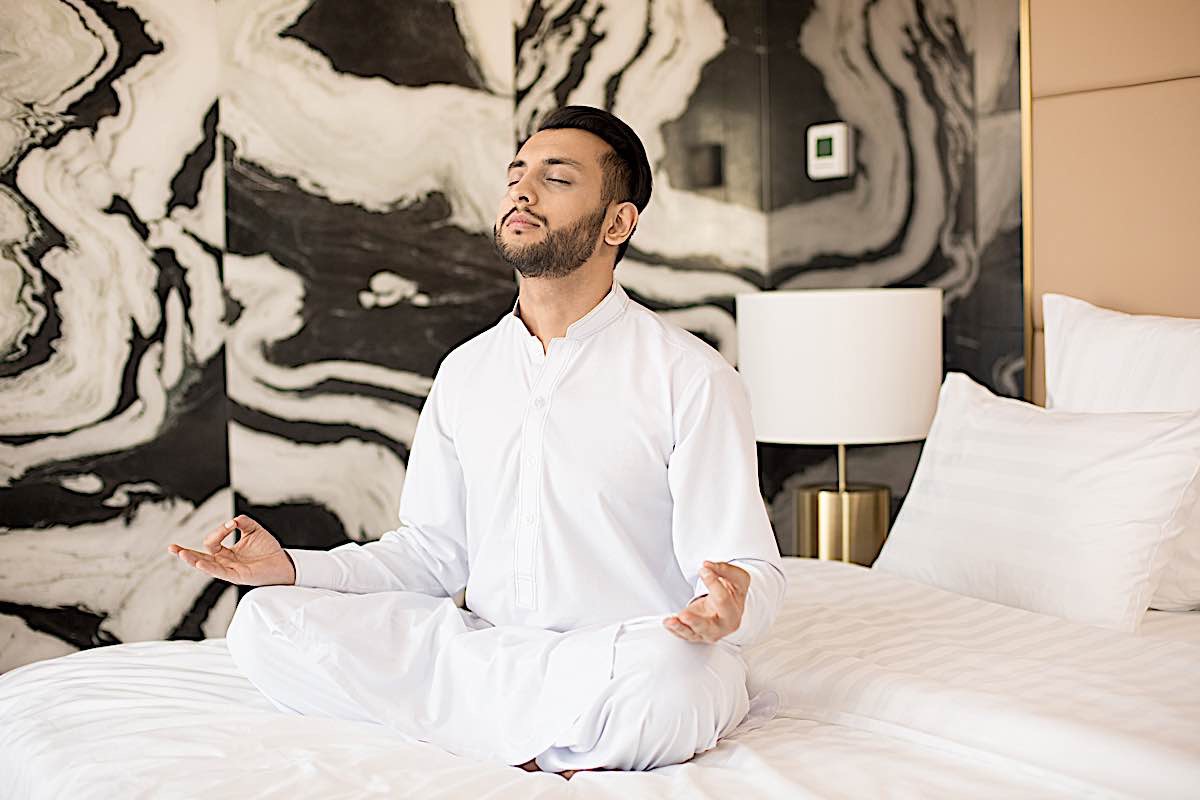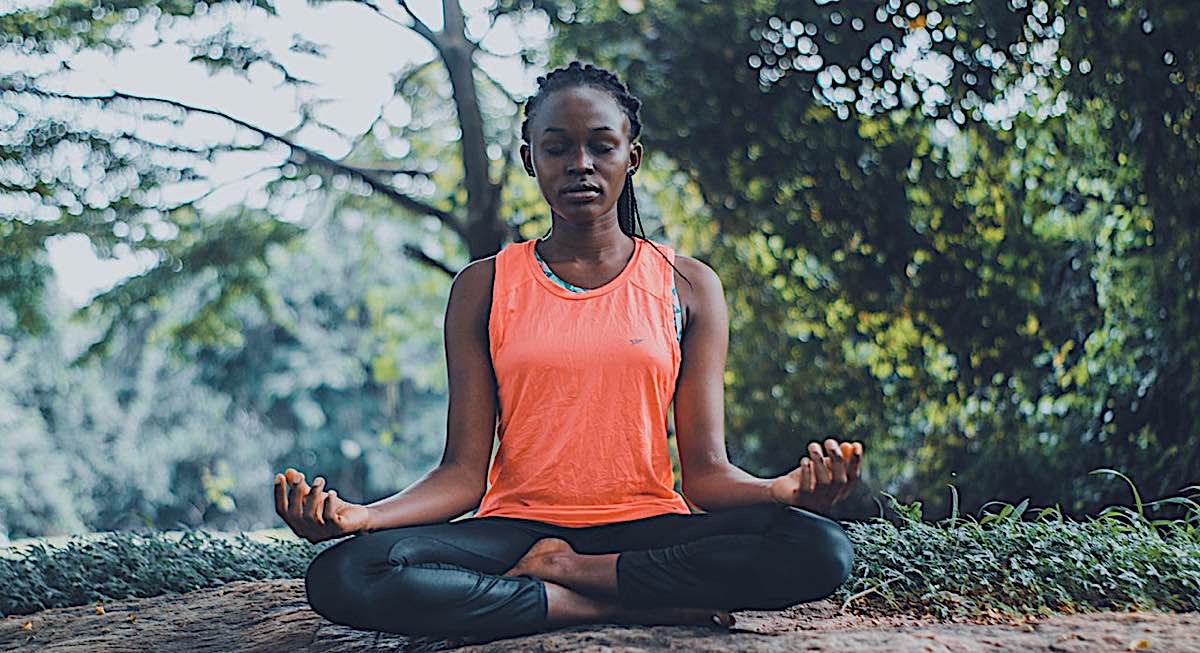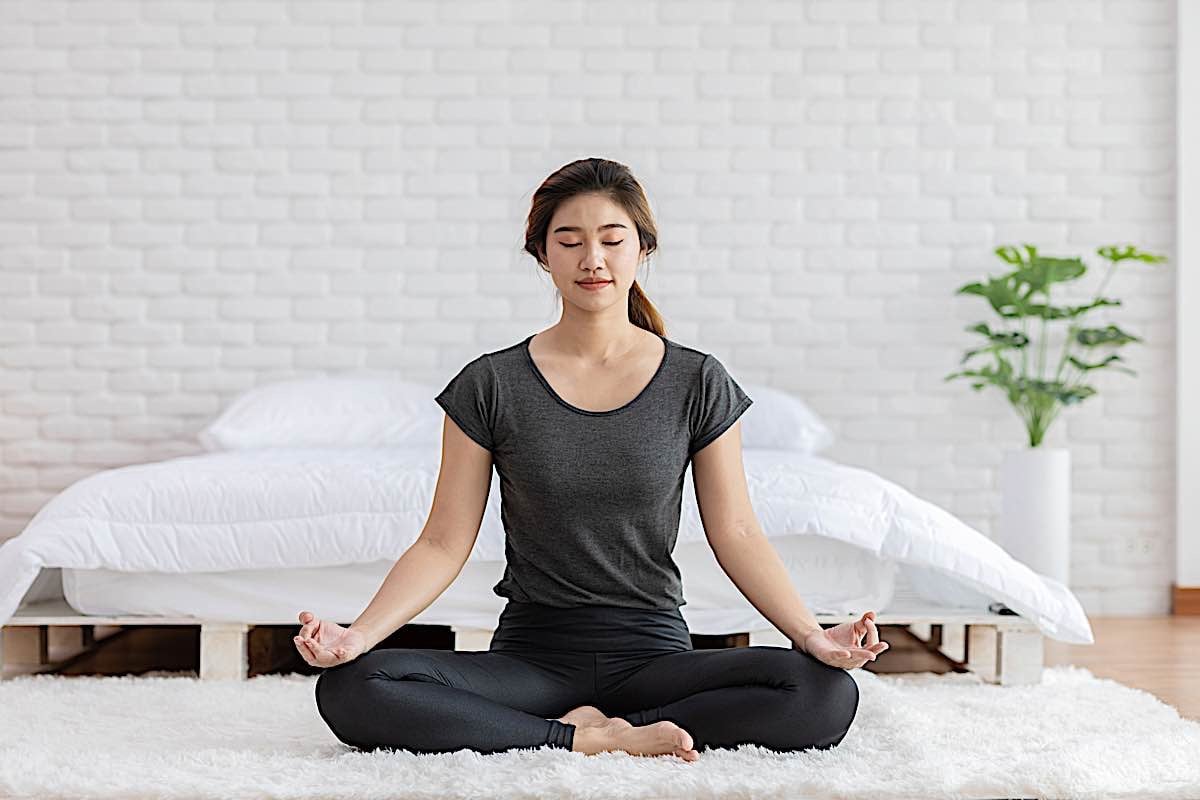Benefits of meditating before bed; especially now, as we endure lockdowns, meditation can help you relax and sleep
If you practice meditation, you can probably vouch for its wide array of health benefits, as meditation has the ability to improve your concentration, relieve stress, lower blood pressure, and put you in the right mindset to take on your day. That’s one of the main reasons why it’s common for most people to practice meditation in the morning — but have you ever considered trying it at night before you go to bed? Especially now, as we endure lockdowns and social distancing, the de-stressing effect of meditation can be very helpful.
By McKenzie Dillon
[Biography below]

Pre-bedtime meditation can have a tremendous effect on a person’s quality of sleep, making it a great alternative for those who prefer to rely on natural sleep aids when they’re struggling to fall asleep. According to the American Sleep Apnea Association, 50 to 70 million Americans suffer from sleep-related issues whether it’s due to a disorder, busy schedule, or taking care of young children. Sleep deficiency has an impact on your mood, ability to learn and retain information, slows down your response time, alters decision making, and can even lead to serious health issues like heart disease, diabetes, high blood pressure, and heart failure. Here are a few ways meditating before bed can help you catch up on your zzzzz’s to ensure you stay healthy both physically and mentally.

Reduce Anxiety And Stress Levels
There are many different forms of meditation, and mindfulness meditation is one of the best types to help relieve anxiety and stress before bed. One major cause of sleep deficiency is stress, and practicing mindfulness teaches you how to cope with anxiety and control your emotions more effectively so you have a more calm response to stressful stimuli. Mindfulness can be defined as the practice of being mindful, or in other words, being hyper-aware of your body and mind in the moment of meditation.
Yoga is a popular form of mindfulness, since you fixate your focus on your breathing and movement of the body. Meditative movements like yoga and deep breathing can slow the heart rate, lower blood pressure, promote relaxation, and help with your body’s internal response to stress.

Relax Your Muscles Before Bed
As we just mentioned, yoga is an effective form of meditation and allows you to practice mindfulness. It also can relieve tension in your muscles so your body feels relaxed and prepared for 7+ hours of sleep, which is especially nice for somebody who sleeps on a medium-firm bed because they likely aren’t getting a ton of pressure relief throughout the night from their mattress.[1] Try out gentle yoga poses that will give your muscles a good stretch without being too straining, such as the butterfly pose or even a low lunge.
Improve REM Sleep Cycles
People go through different circumstances in life that cause changes in a person’s sleep patterns, like pregnant women or those who are getting riper in age. One major issue for people over 50-years-old is the reduction of time spent in the deepest stage of non-REM sleep. It’s harder for older individuals to fall asleep from the get-go, and they spend less time in a deep sleep which causes them to wake up more frequently throughout the night.

Vipassana meditation, which “focuses on the deep interconnection between mind and body” according to the official Vipassana website, can increase REM sleep states and prevent Slow Wave Sleep from diminishing. This makes it an ideal method of meditation for seniors, who can use it to get their regular sleeping patterns back on the right track.
Treat Sleep Disorders
One in ten people say they deal with insomnia on a regular basis, meaning there is a significant amount of people who aren’t getting nearly enough sleep at night. There have been multiple studies that analyze the effect of meditation on people who suffer from sleep disorders, and the results proved to be extremely successful in the short and long term.

One telling study shows that after taking a mindfulness course, individuals with insomnia took half as long to fall asleep than they did before, reducing time from 40 minutes to only 20 minutes. Additionally, at the end of a different meditation study, 60% of those who participated were no longer considered insomniacs. What was even more impressive, though, was how the impact of meditation stayed with the participants 12 months later when researchers returned to perform a follow-up study.
NOTE
[1] Reviews of medium-firm beds>>
Sources
– 50-70 million Americans suffer from sleep-related issues
– Negative effects of sleep deficiency
– Stress is one major reason why some suffer from a lack of sleep
– Deep breathing lowers blood pressure, slows heart rate
– Benefits of Vipassana meditation
– Studies about meditation’s effect on people with sleep disorders
More articles by this author
Search
Latest Features
Please support the "Spread the Dharma" mission as one of our heroic Dharma Supporting Members, or with a one-time donation.
Please Help Support the “Spread the Dharma” Mission!

Be a part of the noble mission as a supporting member or a patron, or a volunteer contributor of content.
The power of Dharma to help sentient beings, in part, lies in ensuring access to Buddha’s precious Dharma — the mission of Buddha Weekly. We can’t do it without you!
A non-profit association since 2007, Buddha Weekly published many feature articles, videos, and, podcasts. Please consider supporting the mission to preserve and “Spread the Dharma." Your support as either a patron or a supporting member helps defray the high costs of producing quality Dharma content. Thank you! Learn more here, or become one of our super karma heroes on Patreon.
McKenzie Dillon
Author | Buddha Weekly
McKenzie Dillon is a blogger and sleep enthusiast for The Slumber Yard, a review site that focuses on bedding products. In her free time, she likes attending music festivals, reading fiction novels and practicing yoga.













